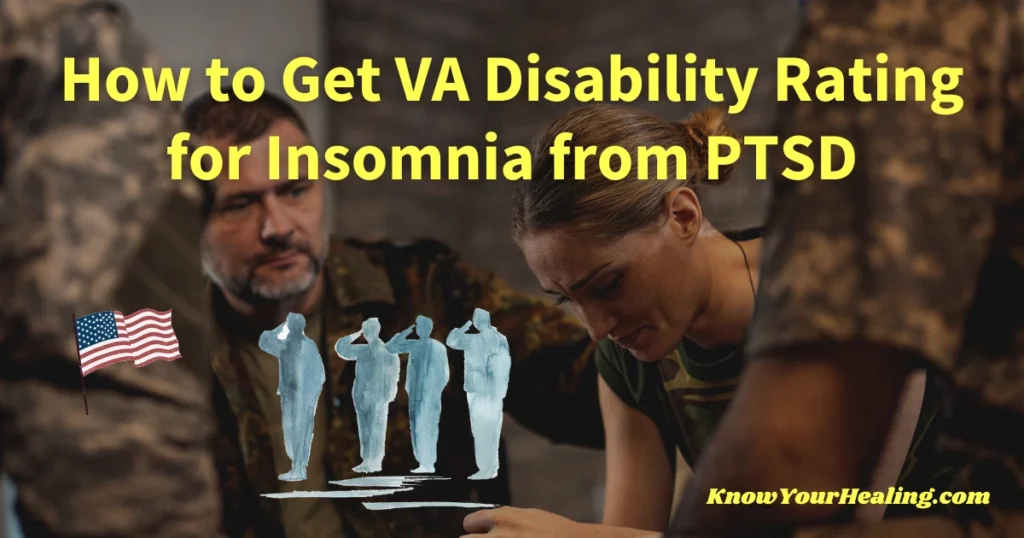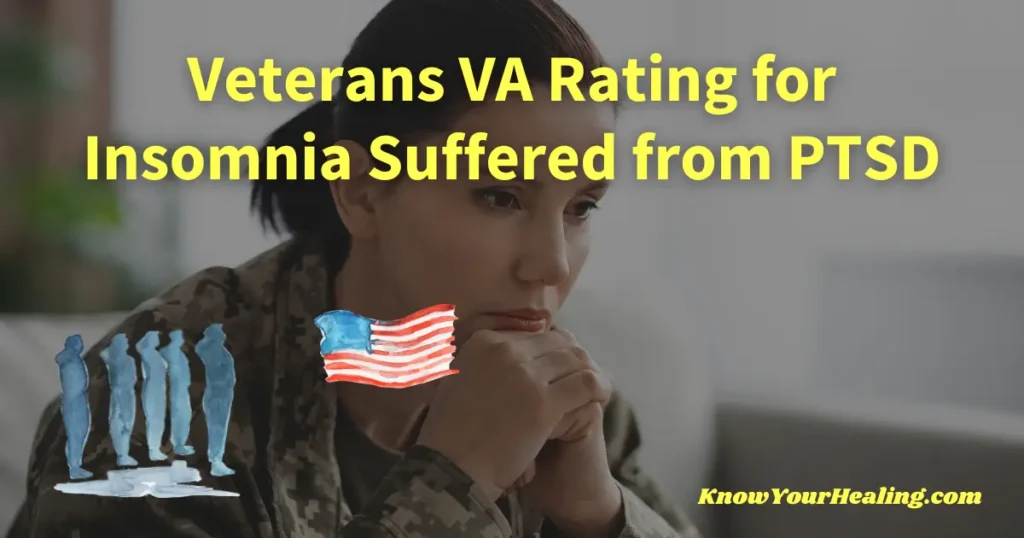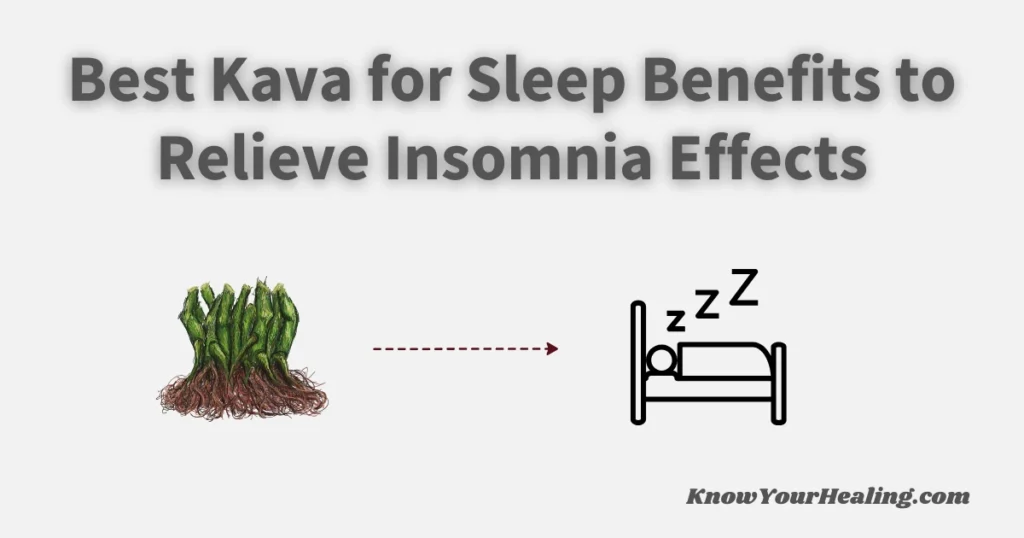VA disability rating for insomnia is crucial for veterans dealing with the impact of PTSD on their sleep. Many veterans find it challenging to get proper rest due to insomnia caused or worsened by PTSD.
This article provides strategies for securing a VA disability rating for insomnia secondary to PTSD while ensuring that veterans receive the support they deserve.
The process can sometimes be complex, and many veterans are unsure how to navigate the system and prove their case effectively.
Linking insomnia to PTSD through medical evidence is vital for a successful claim.
By understanding the steps involved, veterans can increase their chances of receiving the rating they need to aid in recovery.
Veterans need accurate information to connect their insomnia to their service-related PTSD effectively. A successful claim can significantly improve their quality of life by granting them access to necessary benefits.
Knowing the essentials of filing a claim is key for those struggling with this issue.
Understanding VA Disability Ratings

Veterans experiencing insomnia secondary to PTSD can seek VA disability benefits. These benefits help account for how the condition impacts daily life and the ability to work.
Understanding how the VA assigns disability ratings can aid in navigating the claims process.
Basics of VA Disability
The VA assigns a disability rating based on the severity of a service-connected condition. This rating influences the amount of monthly compensation a veteran receives.
A key element of this process is linking the condition to military service.
Medical records and a medical nexus are essential in establishing this connection, particularly for conditions like PTSD-related insomnia.
The schedule of ratings details how different conditions, including mental health disorders, are rated.
Conditions are assessed for symptoms such as chronic sleep impairment and occupational and social impairment.
A C&P exam may be conducted to evaluate the veteran’s condition and determine the appropriate rating.
Veterans with multiple conditions may have their ratings combined to reflect their overall impairment level.
Determining Disability Ratings
The VA considers specific criteria for insomnia and related conditions to assign a VA disability rating. Conditions are rated from 0% to 100%, depending on severity.
Symptoms impacting family relations, routine activities, or ability to perform occupational tasks can influence the rating.
For example, chronic sleep disturbances might lead to a higher rating if they significantly decrease work efficiency.
Some veterans qualify for Total Disability Individual Unemployability (TDIU) if their insomnia or combined disability rating is 60% or higher.
This allows them to receive compensation at a 100% rate, reflecting their inability to maintain gainful employment.
The Board of Veterans’ Appeals reviews claims and can overturn rating decisions if additional evidence supports increased impairment due to the veteran’s service-connected insomnia.
Eligibility Criteria for VA Disability for PTSD
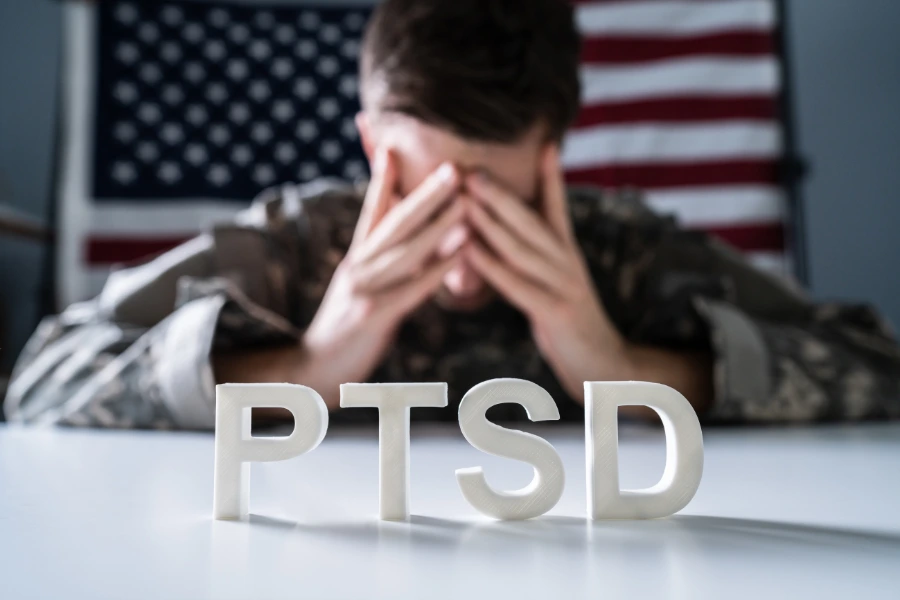
To obtain a VA disability rating for PTSD, veterans must meet specific criteria. These include defining PTSD as it pertains to VA claims and establishing a connection between PTSD and military service.
Defining PTSD
PTSD (post-traumatic stress disorder) is a mental health condition triggered by experiencing or witnessing terrifying events. For veterans, this may include combat situations or other trauma during active duty.
PTSD symptoms can involve flashbacks, nightmares, severe anxiety, and uncontrollable thoughts.
The VA uses a specific diagnostic code from the Statistical Manual of Mental Disorders to classify PTSD.
Veterans must provide medical records and a diagnosis from a medical professional to validate their condition.
These records should highlight the severity of symptoms like panic attacks, social impairment, or suicidal ideation, affecting daily life and routine activities.
Demonstrating PTSD through documented evidence is crucial for the VA disability claim process to move forward.
Service Connection Requirements
To receive VA benefits for PTSD, a veteran must establish a service connection. This involves demonstrating PTSD is directly linked to an event that occurred during military service.
Veterans must identify an in-service stressor, such as combat exposure or personal trauma, supported by credible evidence.
A nexus letter from a medical professional can help establish this link.
The VA often requires a compensation and pension (C&P) exam to evaluate the symptoms and how they impact veterans’ ability to work or maintain social relationships.
The VA examiner considers factors like occupational tasks and the impact on family relations when assigning a PTSD rating.
A successful connection significantly influences the percent disability rating, impacting the veteran’s compensation.
PTSD-Related Insomnia
PTSD can significantly affect sleep patterns, leading to issues such as insomnia.
Veterans experiencing PTSD may struggle with both falling and staying asleep, impacting their daily functioning.
Understanding the connection between PTSD and sleep disturbances is crucial for those seeking a VA disability rating for insomnia.
What is Insomnia?
Insomnia is a sleep disorder that makes it difficult to fall asleep and stay asleep. While individual sleep needs vary, most adults require seven to eight hours per night.
A lack of adequate sleep can negatively affect bodily functions, leading to fatigue, irritability, and impaired concentration.
| Types of Insomnia | Description |
|---|---|
| Acute Insomnia | Lasts for a few weeks, typically less than a month, and is often triggered by stress or a specific event. Sleep usually improves once the stressor is resolved. |
| Chronic Insomnia | More common among veterans, this type lasts for months or years and can be caused by trauma, PTSD, other mental health issues like depression, or physical pain. |
Additional symptoms of insomnia include difficulty falling asleep at night, waking up during the night or too early, feeling unrefreshed after sleep, daytime fatigue, depression or anxiety, memory issues, an increased likelihood of accidents or errors, and persistent concerns about sleep.
Link Between PTSD and Sleep Disturbances
Post-traumatic stress disorder can lead to a range of sleep disturbances, including both acute and chronic insomnia.
Veterans often experience nightmares, which are intrusive symptoms found in the diagnostic code for PTSD. These nightmares can cause frequent awakenings, leading to fragmented sleep and persistent fatigue throughout the day.
Sleep disturbances may be considered a symptom of PTSD when evaluating a veteran’s VA disability claim.
Insomnia secondary to PTSD can impact both mental and physical health, requiring intervention from a medical professional.
Veterans Affairs (VA) examiners assess medical records and sleep studies to determine the level of impairment and provide appropriate ratings based on the schedule of ratings.
Impact of Insomnia on Veterans
Insomnia can lead to significant challenges in a veteran’s life, affecting occupational tasks and family relations.
Veterans may face mild memory loss, social impairment, and a decrease in work efficiency, all contributing to the percent rating of their disability.
Chronic sleep impairment can lead to difficulties in maintaining interpersonal relationships.
For veterans with PTSD, insomnia can exacerbate other symptoms like anxiety, depression, and even panic attacks.
This can lead to such symptoms as total disability, rendering the veteran unable to engage in gainful employment.
Addressing insomnia as part of the overall VA disability compensation process helps improve the quality of life for those affected by service-connected conditions.
VA treatment records and a nexus letter from a medical professional are crucial components in securing a favorable rating decision.
Documenting Insomnia for VA Claims
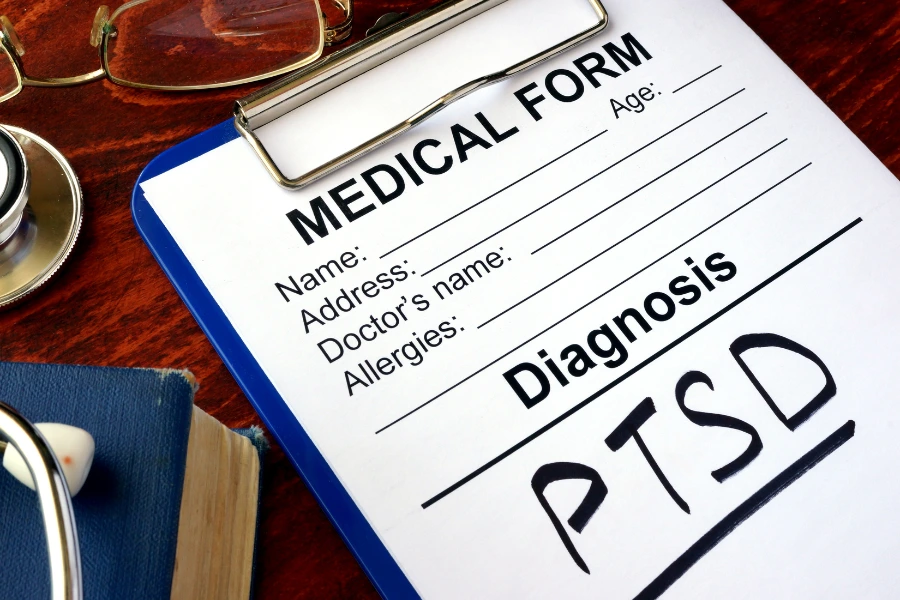
When pursuing a VA disability rating for insomnia linked to post-traumatic stress disorder, proper documentation is crucial. Veterans must present detailed medical evidence to substantiate their insomnia claims, while sleep studies can provide additional support.
Gathering Medical Evidence
To secure a VA disability rating for insomnia, veterans need comprehensive medical records showing the condition’s impact on daily life. This includes formal diagnoses from qualified healthcare providers.
Documentation should highlight symptoms such as chronic sleep impairment and insomnia secondary to PTSD.
Including notes on how insomnia affects occupational tasks, social relationships, and routine activities is helpful.
Veterans should compile evidence like treatment histories, medical professional evaluations, and VA treatment records.
A nexus letter can establish a connection between active duty and insomnia. This document may outline how military service and related stressors contribute to the veteran’s sleep-related disorder.
Medical nexus opinions are integral in forming a direct or secondary service connection for a higher rating.
Importance of Sleep Studies
Sleep studies can play a pivotal role in corroborating insomnia claims.
Such assessments provide objective data on sleep patterns and disturbances, offering insights into the severity of the sleep disorder.
Results from these studies can demonstrate the physical conditions related to insomnia, such as chronic insomnia or high blood pressure.
When documented properly, these findings contribute to understanding the veteran’s ability to maintain gainful employment.
Incorporating findings from sleep studies into the VA disability claim can significantly affect the rating decision.
This might influence the VA examiner’s evaluation and the resulting percent disability rating.
Establishing clear evidence of sleep disturbances can be critical in demonstrating the degree of social and occupational impairment.
Service Connection for Insomnia
Understanding how insomnia is connected to military service is crucial for veterans seeking VA disability benefits. Establishing this connection requires specific evidence showing that insomnia is linked to service conditions or is secondary to conditions like PTSD.
Sleep Disorders and Service Connection
Sleep disorders such as insomnia are common among veterans and can significantly impact their daily lives.
To qualify for a VA disability rating for insomnia, veterans must demonstrate that their condition is linked to their military service.
This involves showing that insomnia started during or was aggravated by active service. It can also be secondary to other service-connected conditions like PTSD, anxiety, or depression.
The VA assigns sleep disorder ratings based on symptoms’ severity and their impact on social and occupational functioning.
Chronic insomnia, for instance, may result in increased social impairment and decreased work efficiency.
Understanding the diagnostic code and criteria in the Schedule of Ratings is essential in building a strong claim for VA disability compensation.
Demonstrating Nexus to Military Service
Demonstrating a nexus, or connection, between insomnia and military service involves providing comprehensive medical evidence.
This can include medical records, a medical nexus letter from a healthcare provider, and documentation of how insomnia impacts the veteran’s life.
The evidence must show that insomnia symptoms, such as impaired sleep, are directly linked to service duties or result from service-connected conditions.
A VA or C&P exam is crucial in determining the extent of the insomnia and its service connection.
This exam allows a VA examiner to assess symptoms such as chronic sleep impairment and their effect on occupational and social tasks.
Post-traumatic stress disorder is a common service-related condition that might lead to insomnia.
Veterans may experience sleep disturbances due to recurring nightmares or stress from memories of active duty, further proving the service connection.
Building a Strong VA Disability Claim for Insomnia

Crafting a strong VA disability claim for insomnia involves several key elements. Veterans seeking a disability rating must effectively compile evidence, write detailed lay statements, and consider seeking expert assistance to ensure a successful outcome.
Key Components of a Successful Claim
A successful VA disability claim for insomnia starts with gathering comprehensive medical records.
Veterans must document their insomnia symptoms, including chronic sleep impairment and daily life impacts.
Demonstrating how insomnia affects their occupational tasks and social relationships is crucial.
The claim should reference post-traumatic stress disorder or any other related mental health disorders if insomnia is secondary to these conditions.
The diagnostic code and schedule of ratings for mental health conditions can guide veterans in understanding potential disability percentages.
Veterans should highlight any connection between insomnia and active duty or military service experiences.
A medical nexus—or proof linking insomnia to service conditions—is often necessary.
VA treatment records or reports from a VA examiner can substantiate the claim.
Utilizing Lay Statements
Lay statements can be invaluable in a disability claim. These personal accounts provide additional perspectives on how chronic insomnia affects veterans’ lives outside of clinical settings.
Statements from family, friends, or coworkers can illustrate changes in routine behavior or social impairment.
These narratives should focus on specific symptoms of insomnia, such as emotional distress, physical conditions linked to sleep issues, and mental health condition exacerbations like panic attacks.
Lay statements may also highlight interpersonal impacts, like family relations strain, and workplace challenges, such as decreased work efficiency or intermittent periods of inability to concentrate.
This personal insight strengthens the overall claim.
Seeking Expert-Level VA Claim Help
Enlisting the help of a medical professional familiar with VA claims can be crucial.
Experts can assist in interpreting secondary service connection requirements and crafting a comprehensive claim strategy.
A detailed nexus letter from a physician can enhance the claim’s validity.
Veterans may also benefit from consultation with a claims agent or attorney knowledgeable about VA disability compensation.
These professionals understand the nuances of the Department of Veterans Affairs regional office processes and can help you navigate the claims system.
Considering individual unemployability and aiming for a higher rating may be appropriate for cases where insomnia significantly impacts the veteran’s ability to maintain gainful employment.
Professional assistance can optimize the potential for a favorable rating decision.
VA Rating for Insomnia and PTSD
The VA disability rating for insomnia linked to PTSD is significant for those seeking compensation.
PTSD can lead to chronic insomnia, impacting a veteran’s daily life and functioning. Understanding how ratings are determined is key for veterans navigating the VA disability claim process.
Understanding the Schedule of Ratings for Mental Disorders
VA disability ratings for insomnia related to PTSD are evaluated under the schedule of ratings for mental disorders.
This criterion assesses how such symptoms impact social and occupational tasks.
The diagnostic code for PTSD-related insomnia is crucial in determining eligibility. Ratings range from 0% to 100%, reflecting the severity of conditions and their effect on daily life.
Veterans might experience symptoms like panic attacks, mild memory loss, and decreased work efficiency.
Thorough medical records demonstrating chronic insomnia and its connection to military service are essential to support the claim.
Veterans may need a nexus letter from a qualified medical professional confirming this connection.
Calculating the Combined Rating
For veterans with multiple service-connected conditions, calculating the combined rating is essential.
PTSD often coexists with other conditions like chronic pain, affecting the overall disability percentage.
The VA uses a specific formula to determine the final rating, which can influence eligibility for total disability or individual unemployability.
The combined rating impacts VA disability compensation and can change based on additional evidence or new VA examination.
This process involves evaluating how PTSD and insomnia, as connected conditions, affect the veteran’s ability to maintain gainful employment.
Veterans should remain proactive by continuously updating the Department of Veterans Affairs regional office with any changes in their condition or symptoms.
Challenges and Appeals in VA Disability Claims

Navigating VA disability claims can often be complicated. Veterans seeking disability ratings, particularly for conditions like insomnia related to post-traumatic stress disorder, face challenges, especially if initial claims are denied. Understanding the appeal process and available options can help address these challenges effectively.
When a veteran’s VA disability claim is denied, it can be due to various reasons, such as insufficient medical evidence or failure to connect the condition to military service.
Insomnia as a result of PTSD is recognized, yet veterans must demonstrate a clear link to their active duty.
Veterans might need to provide additional documentation, including medical records or a nexus letter, that outlines the association between their insomnia and PTSD.
It is crucial to clarify how insomnia affects their daily life and ability to maintain social relationships.
Addressing potential inaccuracies reported during the C&P exam and offering more detailed information about their sleep-related disorder may bolster their case.
Options for Appeal
Veterans have several avenues to contest a rating decision. The VA’s decision review process offers three primary appeal paths: Supplemental Claim, Higher-Level Review, and Board Appeal. Each option provides distinct ways to challenge the VA’s initial decision.
In a Supplemental Claim, veterans can submit new evidence about their insomnia.
Higher-Level Review requests a senior reviewer to re-evaluate the initial decision without considering new evidence.
A Board Appeal involves the Board of Veterans’ Appeals and can include presenting new medical evidence to strengthen the case for a higher VA disability rating.
Veterans should consult a legal expert or a Veterans Service Officer to determine the most suitable appeal path based on their circumstances.
Proper documentation and a strategic approach can significantly impact an appeal’s decision date and outcome.
Special Cases and Considerations
Navigating the complexities of a VA disability rating for insomnia, particularly when related to PTSD, requires understanding specific situations.
Special considerations apply to Gulf War veterans and those seeking Total Disability based on Individual Unemployability (TDIU).
Both scenarios involve unique aspects of VA claims and require careful attention to details like service connection and medical records.
VA Disability for Gulf War Veterans
Veterans of the Gulf War may experience unique challenges when applying for a VA disability rating for insomnia.
These veterans can sometimes access benefits related to unexplained chronic multisymptom illnesses, which may include sleep-related disorders stemming from service-connected conditions.
Insomnia in Gulf War veterans is often assessed in conjunction with other medical conditions they may have acquired during or after active duty.
The Department of Veterans Affairs recognizes certain presumptive conditions for Gulf War veterans, which can include insomnia.
Insomnia may be considered part of a broader set of symptoms like fatigue or chronic pain.
Veterans should submit comprehensive medical evidence, including any nexus letters, to establish a connection between their military service and insomnia.
This documentation helps in securing an appropriate VA disability rating.
Understanding TDIU
Insomnia can contribute to a veteran’s inability to maintain gainful employment, potentially qualifying them for Total Disability based on Individual Unemployability (TDIU).
Veterans who cannot work due to service-connected insomnia or related mental health disorders may seek this rating.
It requires demonstrating how insomnia affects their occupational tasks and daily life.
A claim for TDIU needs robust evidence of how severe insomnia impacts the veteran’s ability to perform job-related activities.
This includes testimony from medical professionals, VA examination reports, and possibly a C&P exam.
Establishing that insomnia leads to intermittent periods of inability to complete tasks or impacts family relations can support the TDIU claim.
The Board of Veterans considers these factors when determining eligibility for total disability status.
Maintaining and Improving Your VA Disability Rating
Veterans with a service-connected disability like insomnia due to PTSD can benefit from understanding how to maintain and potentially improve their VA rating.
Focused efforts on providing sufficient medical evidence and understanding the VA’s rating criteria can significantly impact disability benefits.
Seeking Higher VA Rating
Veterans aiming for a higher VA rating should gather comprehensive medical evidence demonstrating the severity of their condition.
This involves keeping thorough medical records and documentation of symptoms like chronic sleep impairment and insomnia.
Getting a detailed medical nexus and results from recent sleep studies or VA examinations can support claims.
Such evidence helps establish a connection between insomnia and service-related conditions, proving its impact on daily life and work efficiency.
Veterans can request an increase by filing a new VA disability claim.
Demonstrating how insomnia affects routine activities and social relationships bolsters claims, highlighting the condition’s impact.
Leveraging Special Monthly Compensation
Veterans may sometimes qualify for Special Monthly Compensation (SMC). This additional benefit supports veterans with severe service-connected disabilities, leading to extra needs.
Meeting the criteria for SMC involves showing the disabling effect of insomnia on family relations and the inability to maintain gainful employment.
This underscores the condition’s impact on personal and professional spheres.
Veterans should consult with a medical professional and gather extensive VA treatment records.
It’s crucial to link insomnia with another service-connected disability, which may bolster the case for SMC.
Engaging with the Department of Veterans Affairs Regional Office for guidance can also help clarify eligibility and the process.
Final Thoughts
VA disability rating for insomnia is a crucial aspect to consider for veterans experiencing sleep issues as a result of PTSD.
Proper evaluation and documentation of symptoms can significantly impact the rating process.
To navigate this, veterans should have clear medical documentation.
Lists of symptoms, treatment history, and any supporting statements from healthcare providers are crucial.
Resources like VA Claims Insider offer guidance on connecting insomnia to service-related conditions like PTSD.
Veterans should understand the criteria for each rating level, such as 0%, 10%, 30%, 50%, 70%, or 100%.
Understanding the potential for combined ratings, especially for conditions like insomnia and PTSD, can ensure veterans receive the benefits they deserve.
Hill & Ponton highlight the significance of these combined ratings by addressing the overall impact on daily functioning.
Navigating the VA disability rating for insomnia may require professional assistance. Legal advocates and veteran support groups can provide additional help.
Refer to the valuable insights from Know Your Healing for guidance on dealing with these challenges.
By staying informed and actively pursuing a solid claim, veterans can better manage their symptoms and seek the support they need to live healthier lifestyles.

